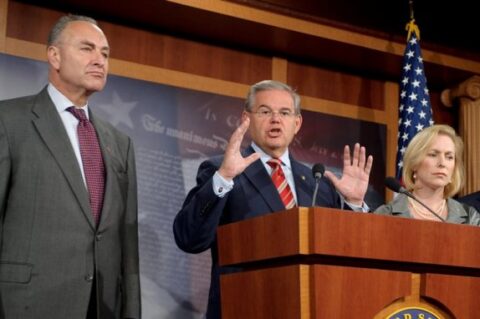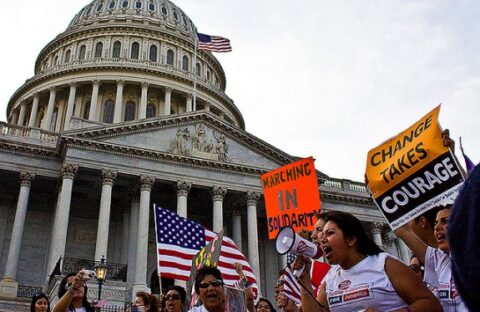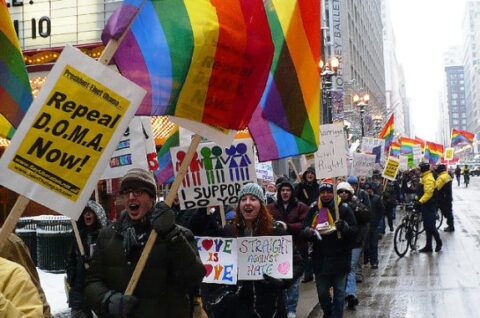Immigration Reform

Sen. Menendez Introduces Comprehensive Alternative to Enforcement-Only Immigration Legislation
While some in Congress continue attempts to enforce a way out of our immigration problems, others, like Senator Robert Menendez (D-NJ), are offering balanced solutions that address not just one, but many facets of our broken immigration system. Today, Senator Menendez (D-NJ), along with Senators Harry Reid (D-NV), Patrick Leahy (D-VT), Richard Durbin (D-IL), Charles Schumer (D-NY), Kristen Gillibrand (D-NY) and John Kerry (D-MA), introduced the “Comprehensive Immigration Reform (CIR) Act of 2011,” a bill which offers a comprehensive framework for lasting reform. Read More

Immigration Group Honors Winner of National 5th Grade Writing Contest
Tonight, the American Immigration Council will honor Maya Young Wong, the winner of the 14th Annual “Celebrate America” Creative Writing Contest, at the 2011 American Heritage Awards in San Diego. Maya Young Wong of California will read her winning poem, “My Grandfather Ben,” which was selected out of more than 6,500 entries by a host of celebrity judges, including Olympic Gold Medalist in wrestling, Henry Cejudo; the President of the America Federation for Teachers, Randi Weingarten; Presidential Medal of Freedom recipient and Holocaust survior, Gerda Weissman Klein; and President pro tem Senator Dan Inouye of Hawaii. Read More

Nativist Group Recycles Discredited Economic Arguments About Immigration
In a report released late last month, the Federation for American Immigration Reform (FAIR) rehashes a number of tired, discredited arguments about the impact of immigration on wages and job opportunities for native-born workers. The report, entitled Poverty and Low-Wage Earners, tries to discount the findings of numerous studies in recent years which have found that immigrants tend to complement rather than compete with native-born workers in the labor market, and that immigrant workers do not undermine wages for their native-born counterparts. FAIR pretends to refute these studies by misrepresenting their findings and their methodologies; creating caricatured “straw men” that can easily be knocked down. Behind that charade, however, a growing body of economic and demographic literature remains which demonstrates that immigrants do not “steal” jobs from natives, and do not create ruinous labor-market competition that drives down wages. Read More

Making E-Verify Mandatory Will Not Magically Solve Our Immigration Woes
Here we go again with the next round of “how we’re going to look tough on immigration without actually accomplishing anything.” This year, mandatory E-Verify is the magic bullet of choice. On Tuesday, House Judiciary Committee Chairman Lamar Smith (R-TX) introduced the “Legal Workforce Act,” which would expand the E-Verify program, making it mandatory for all employers in the United States. A hearing on the bill was held today in the Immigration Policy and Enforcement Subcommittee. Read More

Immigration Tops Economy as Most Important Issue for Latino Voters
According to a poll released yesterday, “U.S. immigration policy” beat out “economy and jobs” as the issue most important for Hispanic voters. The poll, conducted by independent research firm Latino Decisions, asked 500 registered Hispanic voters to name the most important issues facing Hispanics. 51% of respondents said “immigration;” 35% said “economy and jobs;” and 15% said “education.” Pollsters suggest voters’ “direct and personal connection with the problems of the undocumented” as a reason immigration topped the economy—personal relationships that even “affect the political choices of a second or third generation of Latinos born here.” With reform efforts stalled in Congress, many are wondering what kind of political choices Hispanic voters will make in the upcoming 2012 election cycle. Read More

Immigration Tops Economy as Most Important Issue for Latino Voters
According to a poll released yesterday, “U.S. immigration policy” beat out “economy and jobs” as the issue most important for Hispanic voters. The poll, conducted by independent research firm Latino Decisions, asked 500 registered Hispanic voters to name the most important issues facing Hispanics. 51% of respondents said “immigration;” 35% said “economy and jobs;” and 15% said “education.” Pollsters suggest voters’ “direct and personal connection with the problems of the undocumented” as a reason immigration topped the economy—personal relationships that even “affect the political choices of a second or third generation of Latinos born here.” With reform efforts stalled in Congress, many are wondering what kind of political choices Hispanic voters will make in the upcoming 2012 election cycle. Read More

Once Again, Congress Pursues Costly E-Verify Legislation to the Peril of U.S. Economy
Washington D.C. – On Wednesday, the House Judiciary Subcommittee on Immigration Policy and Enforcement will hold a hearing on the “Legal Workforce Act,” another enforcement-only bill introduced today by Judiciary Chairman Lamar Smith (R-TX). The bill would make the electronic employment verification system “E-Verify” mandatory for all employers within two… Read More

Pending a Resolution of DOMA, Immigration Judges Should Exercise Discretion to Stay Removal Cases
BY BETH WERLIN AND VICTORIA NEILSON To date, five states plus the District of Columbia celebrate marriages of gay and lesbian couples and several other states honor such marriages. In addition, five countries, including Canada, permit marriages of gay and lesbian couples and at least fourteen additional countries recognize same-sex relationships for immigration purposes. Yet, because the U.S. immigration agencies rely on section 3 of the Defense of Marriage Act (DOMA)—defining marriage as a union between one man and one woman—lesbian and gay U.S. citizens and lawful permanent residents are barred from obtaining immigrant visas for their spouses, visas that are available to heterosexual U.S. citizens and residents with foreign-born spouses. Gay and lesbian noncitizens also are precluded from obtaining other immigration protections, including relief from removal, based on a marriage to a U.S. citizen or permanent resident. As a result, families are separated and spouses of U.S. citizens and lawful permanent residents are deported from the United States. Read More
Make a contribution
Make a direct impact on the lives of immigrants.
